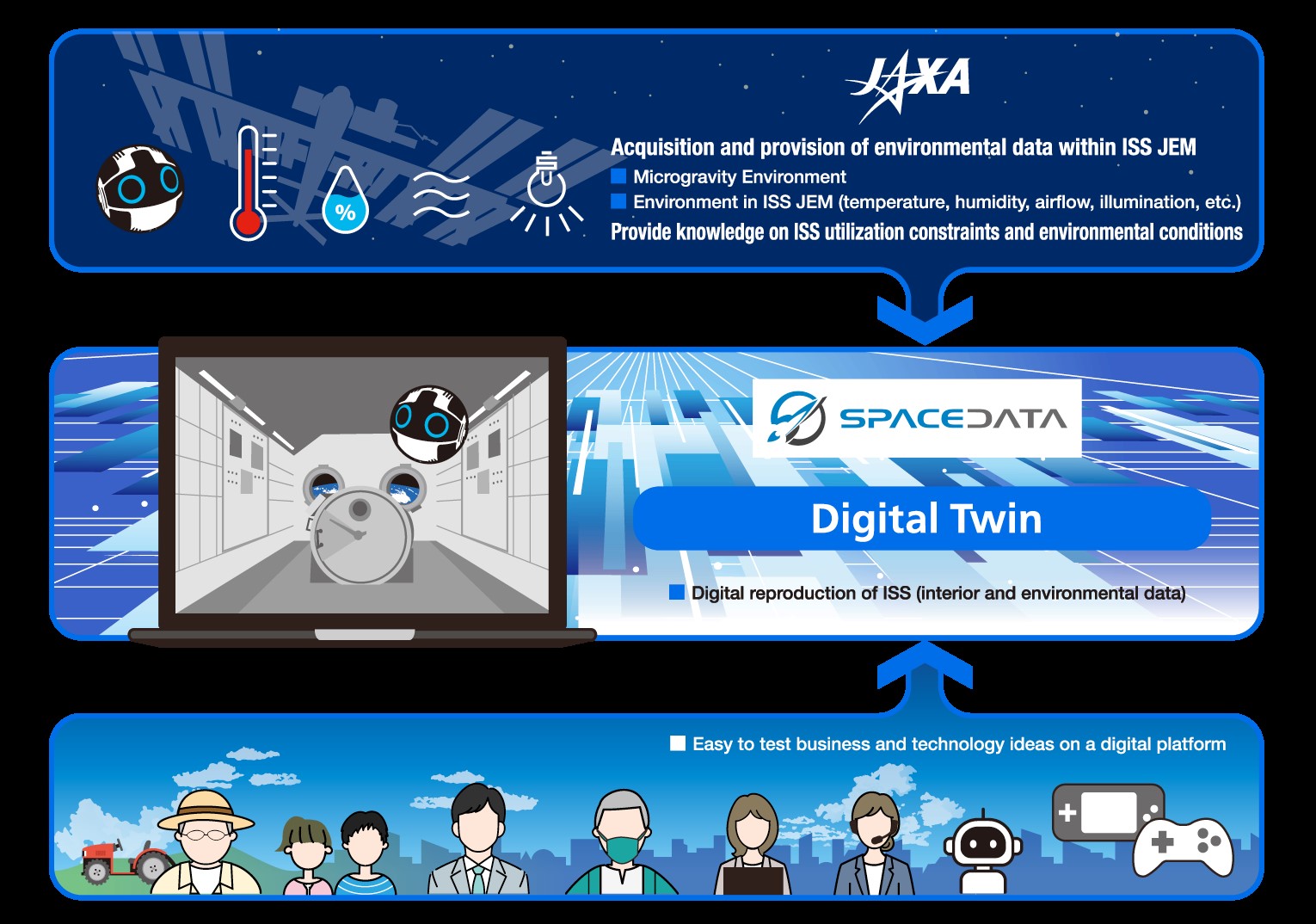SpaceData Inc. and JAXA commence collaborative efforts on the Space Digital Twin Empowering Space Utilization For All
October 31, 2024 (JST)
Japan Aerospace Exploration Agency
Space Data Inc.
SpaceData Inc. and the Japan Aerospace Exploration Agency (President: Hiroshi Yamakawa, "JAXA") are proud to announce a collaborative project under the JAXA Space Innovation Partnership (J-SPARC) (*1), aimed at developing the world’s first "Space Digital Twin" (*2). This partnership will integrate environmental data collected from the Japanese Experiment Module "Kibo" onboard the International Space Station (ISS)—including temperature, humidity, airflow, and illumination—into SpaceData's cutting-edge digital twin platform. By simulating the space environment in a digital format, the project will create a virtual testing ground where space-related business ideas and technologies can be experimented with in a low-cost and easy-accessible manner. This is the first time globally that ISS data will be implemented in such a framework and made available as an open-source resource.

©SPACEDATA /JAXA
Motivation and Goals of the Collaboration
The International Space Station is expected to be retired after 2030, and the future of low Earth orbit (LEO) will likely be shaped by commercial LEO destinations operated by private enterprises. These destinations will invite a broad spectrum of industries, from housing to education and entertainment, but the specialized nature of the space environment can create high entry barriers. By digitally replicating the ISS environment, this collaboration will allow businesses and engineers to test their ideas in a low-cost, risk-free space environment, democratizing access to space and accelerating the commercialization of LEO.
Details of the Collaboration
We will construct a digital twin of the Japanese Experiment Module "KIBO", simulating conditions such as microgravity, airflow, temperature, humidity, and illumination. Through this digital twin, users will be able to understand the specific characteristics of the space environment and repeatedly test behaviors in space. Additionally, we plan to digitally recreate Int-Ball, the internal drone that operates within "KIBO”, providing a valuable simulation environment for space robotics. This will significantly reduce the cost and time required for planning business operations on orbit, improving the predictability of future projects. Furthermore, the space digital twin aims to serve a wide range of industries, from data-driven businesses such as gaming, streaming, broadcasting and virtual space tourism, all without the need for physical launches.
*1
JAXA Space Innovation Partnership (J-SPARC)
J-SPARC is a program that begins with dialogue between JAXA and private companies aiming to enter the space business, leading to a mutual commitment to commercializing new ventures. Through this partnership, both parties collaborate on developing business concepts, creating market-driven technologies, and conducting demonstrations to bring new businesses to life. Launched in May 2018, J-SPARC has already advanced around 50 projects and initiatives.
https://aerospacebiz.jaxa.jp/solution/j-sparc/(Japanese Only)
*2
Space Digital Twin
The Space Digital Twin is a technology that replicates space environments, such as those of space stations, in a digital space. It not only recreates visuals but also simulates conditions unique to space, including gravity, airflow, temperature, illumination, and other specific factors.
https://en.spacedata.jp/business/space-digitaltwinExternal Link
<CEO of SpaceData Inc., Koyo Sato’s Comment>
"At SpaceData, our mission is to democratize space by leveraging digital technology to make space more accessible and within reach for everyone. By embracing open architecture and standardizing our technology, we aim to collaborate with people worldwide to transform space into a part of humanity’s everyday living space. Our partnership with JAXA will open up our space digital twin technology, offering those without direct access to space the opportunity to experiment and innovate. This initiative will help build a new industrial ecosystem centered around space stations, and we envision a future where space becomes a platform that everyone can utilize—just like the internet."

<JAXA Senior Advisor, Human Spaceflight Technology Directorate, Yusuke Matsumura’s Comment>
"The International Space Station will be transferred into commercial space stations which will be managed by private entities after 2020. These commercial stations will open the door to entirely new uses of space, and I believe that the space digital twin could spark the creation of businesses that we haven't even imagined yet. I hope that in 10 years, we’ll look back and recognize this as the moment when the space economy truly began."
